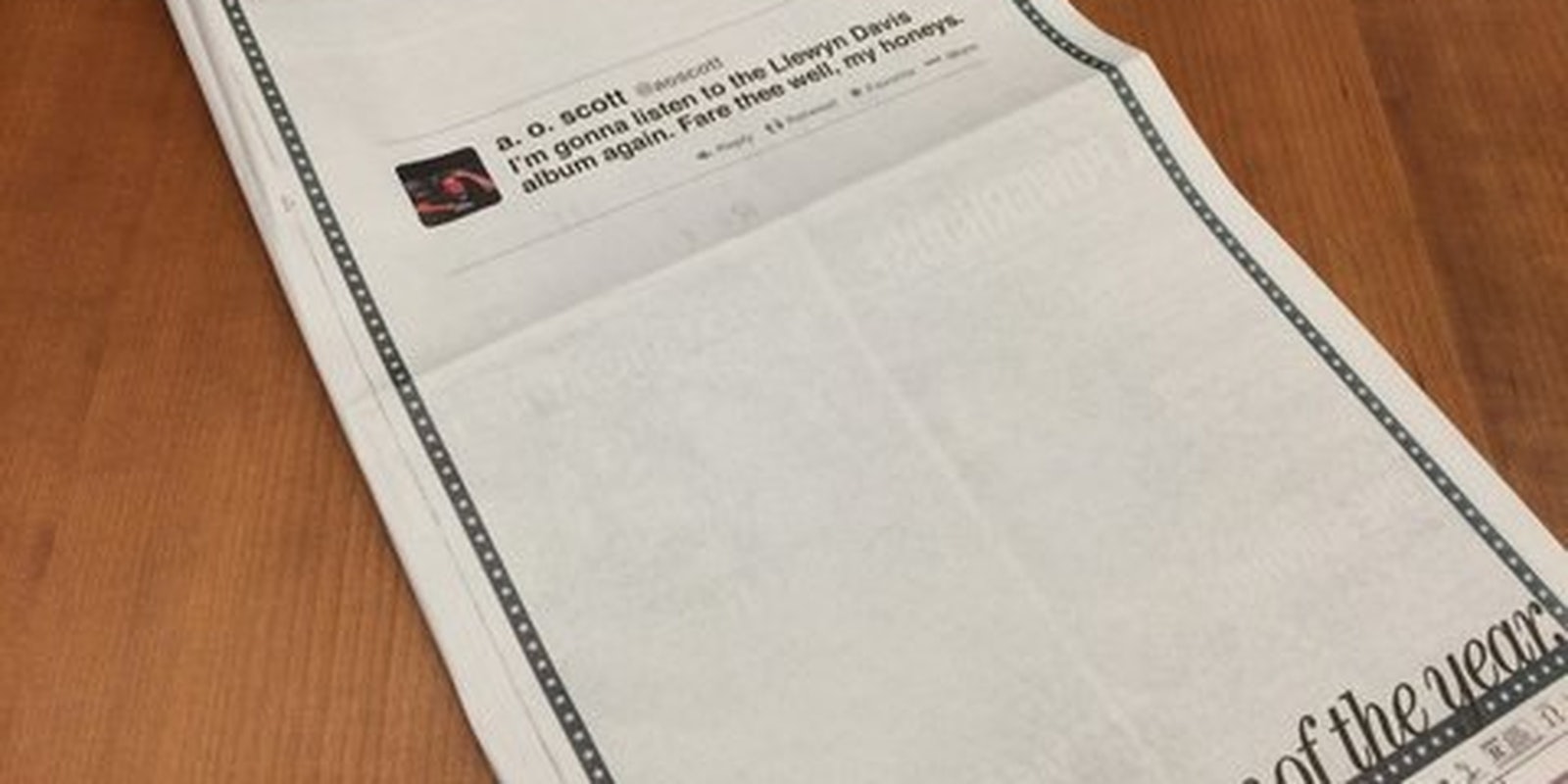Mega-producer Scott Rudin, never quite content with playing second fiddle to polar vortex of rage Harvey Weinstein, has stooped to an even lower level in the moral-free antics known to surround Oscar voting campaigns: stealing a New York Times’ critic’s tweet, after clearly being asked not to, and using it a campaign ad for his latest film, Inside Llewyn Davis.
Renowned Times film critic A.O. Scott tweeted out at the end of the year a seemingly innocuous tweet about the Inside Llewyn Davis soundtrack at the end of last year–an homage to a film he’d already ranked as his top movie of 2013.
You all keep fighting about Wolf of Wall St. and Am Hustle. I’m gonna listen to the Llewyn Davis album again. Fare thee well, my honeys.
— a. o. scott (@aoscott) December 31, 2013
Rudin, never one to pass up free publicity, had the film’s publicist Cynthia Swartz reach out to Scott to see if they could use his tweet—though slightly edited, as strict Academy of Motion Picture Arts and Sciences campaign rules don’t allow for criticizing the competition, and the first line could be misconstrued as such. Scott’s reply?
Well this is a new one. I’d prefer though that my tweets not be used in advertisements. That seems like a slippery slope and contrary to the ad hoc and informal nature of the medium.
And changing the tweet is basically manufacturing a quote, something I avoid.
So I’m afraid the answer is no.
Fair. So what did Rudin do, in the face of a dirty two-letter word he’s not used to hearing? He went ahead and took it anyways.
The full-page ad ran in Saturday’s edition of the Times, and rather than just include Scott amongst a litany of other praise, it featured just Scott’s edited tweet, reading “I’m gonna listen to the Llewyn Davis album again. Fare thee well, my honeys,” mocked up to look like his actual tweet (reply, retweet, favorite buttons and all).
As Scott told Times editor Margaret Sullivan, he was surprised that Rudin had steamrollered his initial objections after being told no, and felt that the paper should have checked with him before approving the $70,000 ad using his words from a personal tweet, rather than a movie review.
For his part, Rudin is wholly unapologetic, claiming that he’s used tweets in the past to market movies, and finds no difference between what a critic writes in a review and what he tweets out. “If a critic is going to tweet it, we’re free to use it. We’re free to edit any review. We pull out what we want.”
Moreover, the Times advertising department approved the ad, which Rudin sees as the exculpatory evidence he already felt no need to produce.
It’s no secret that marketing departments routinely cherry-pick out-of-context quotes to pad their commercials with soundbites and glowing reviews as best they can. I once co-wrote what was essentially a scathing review of NBC’s new comedy Sean Saves The World, and while I did limply mention that I am a fan of Sean Hayes, my overall view on the show was not so favorable. And yet, imagine my surprise when my coworker saying “Sean will save with [a] weak passive victory,” and me following up with “And excellent teeth,” somehow got turned into “Sean Hayes is excellent,” in glowing capital letters on a commercial a few months later.
Rudin cutting down Scott’s quote to fit his needs is technically no surprise—not just in Rudin’s boundaryless world, but in marketing as a whole. Furthermore, Scott’s tweets are public, and not privately limited to his over 36,000 Twitter followers, which blurs the line further between Scott, the film critic, and Scott, the human who fired off a tweet about a song he liked. GigaOm reporter Matthew Ingram points out that while Rudin only acknowledges violating the laws of common decency, he violated Twitter’s Terms of Service, which states that “In all cases, without explicit permission of the original content creator, Twitter content may not be used in advertising.”)
In a world where the privacy-obsessed routinely pepper their Twitter bios with meaningless phrases such as “RTs do not constitute endorsements,” the Rudin v. Scott debate quickly morphed into a more typical journalistic discussion about the separation of church and state between editorial and advertising. However, the question still remains for writers: if you use Twitter as a public medium for sharing opinions on the things you’re paid separately to write about, can you be upset when those opinions are cited just as equally as your regular work?
Regardless of where you stand on the ever-morphing debates of tech etiquette, one classic rule stands. Never ask first, just apologize later. Unless you’re Scott Rudin–then ask anyways, never apologize ever.
Screengrab via New York Times public editor


